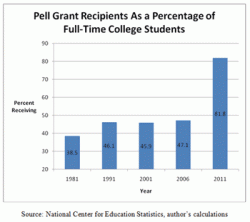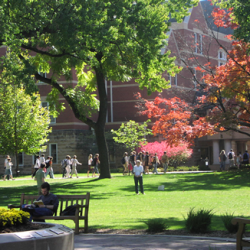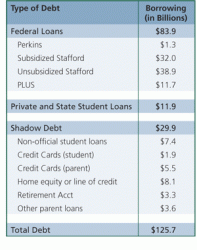
The recently released College Cost Reduction Act (CCRA) improves the financial aid system. The determination of a student’s financial aid eligibility involves two key components: the Student Aid Index (SAI) and the Cost of Attendance (CoA). The SAI represents the government’s estimate of what a student—and their parents if the student is dependent—can afford to contribute […]
Read More
Many politicians, including senators such as Tom Harkin and Dick Durbin, have grown indignant over the allegedly vast amounts of higher education money captured by for-profit institutions via the Pell Grant program. In fact, they consider this something of a scam. The truth, of course, is that throughout its history, including now, the vast majority […]
Read More
Shirley Tilghman, who has just announced that she will step down as president of Princeton at the end of the academic year, was chosen as the successor to former president Harold Shapiro in part because the powers that be thought it about time that the university had a female in that office. She was the […]
Read More
The current conversation on higher ed reform coming is unusually platitudinous even for an election year. This was clearest earlier this year during the battle between Barack Obama and Mitt Romney on the proposed federal student loan interest rate, a subject fairly inconsequential in larger problem of sky-high college costs. In his Democratic nomination acceptance […]
Read More
Concordia University in St. Paul made news by cutting regular tuition costs by a hefty 33.7 percent–$10,000–leaving students to pay $19,700 if they receive no assistance or discounts. But the reduction disguises a fact true at Concordia and at most every other private schools: up to half of undergraduates don’t pay the full fee. At […]
Read More
Universities are in the knowledge business, and the creation and dissemination of it is at the very core of what colleges do. Yet some forms of knowledge about higher education itself are either unknown, or hidden from the public. Why? Release of the information would prove embarrassing and possibly even costly to the school. 1. […]
Read More
The vast majority of American colleges and universities make admission decisions without considering the financial need of applicants. Only a handful of private institutions admit their entire first-year class need-blind and then fully meet the financial need of all of their admitted students through a combination of grants, loans and employment opportunities. These institutions tend […]
Read More
As part of its series on higher ed issues in the 2012 campaign, the Chronicle of Higher Education has a long opinion piece in the form of a news article accusing Republicans of hypocrisy. In “Self-Sufficient, With a Hand From the Government,” author Scott Carlson claims to find “a striking dissonance” between the moving “pull-oneself-up-by-the-bootstraps […]
Read More
(reprinted from Joe Asch’s Dartblog) While the College takes pride in extending generous financial aid to 57.4% of the student body, the other 42.6% pays full whack. That’s an amazing thing when you think about it. The average American family income is $49,445, yet a great many Dartmouth families can pull together $62,125 (according to […]
Read More
I’d like to respond to Peter Sacks’ critique of my new study. Something that I think is lacking from Sacks’ critique is any sort of acknowledgement of what the paper is about. So, for those that haven’t read it yet, here is the basic story of my report…
Read More
When individuals seek higher education, why should all of us have to pay? After all, individuals decide whether to seek a college degree based on their own calculations of expected costs and benefits. That taxpayers must bear the burden of financial aid to these individuals seems unfair. Given the billions of dollars governments pay individuals […]
Read More
A new report on higher education from the American Enterprise Institute, out today, contains an eye-catching finding likely to generate a lot of headlines: the more selective a school is, and the fewer low-income students it serves, the larger its taxpayer subsidy. Calling this system of funding “perverse,” the report says: “Average taxpayers provide more […]
Read More
By now the “Cupcake War” in which the Berkeley College Republicans sold cupcakes with different prices for various ethnic/racial/gender groups is well known. Drawing less attention is why it produced the panicky overkill reaction, including strong condemnations from some university administrators. After all, the anti-affirmative action bake sale hardly threatens the diversity infrastructure and is […]
Read More
In a recent essay in The Atlantic, Andrew Hacker and Claudia Dreifus lament that most students have to take out college loans. They write: “At colleges lacking rich endowments, budgeting is based on turning a generation of young people into debtors.” While Hacker and Dreifus blame the universities for encouraging students to take on more […]
Read More
A recent survey of college admissions officers, sponsored by insidehighered.com, has attracted some attention in the press, such as this story in the New York Times and, of course, this account at Insidehighered.com (there is a link to a pdf of the full survey report). It’s a valuable document that reveals attitudes and policies among admissions officers […]
Read More
By Andrew Gillen, Matthew Denhart, and Jonathan Robe As they defend tuition increases to irate students and parents, college and university leaders often argue that tuition does not cover their costs and that they are therefore subsidizing their students’ educations. Take, for example, what Southwestern College President Dick Merriman said in an October 2010 piece for The Chronicle of Higher […]
Read More
Neither liberals nor conservatives take the education part of higher education very seriously. Instead, college gets used as an arena for special interest promotion and ideological dispute. The right publishes lists of “The 101 Most Dangerous Academics in America” while fulminating about post-modernism and the hedonist student culture. The left pours endless billions of taxpayer […]
Read More
By Andrew Gillen and Robert Martin The annual release of Trends in Student Aid and Trends in College Pricing are big news in the higher education world, and rightly so. Since Department of Education data often take a year or two to become available, these reports provide the earliest and most comprehensive preliminary look at […]
Read More
————————————- Read Part 1 here. ————————————- In examining the gulf between sticker price and real cost, let’s consider the top 10 national universities as defined by U.S. News & World Report in its most recent rankings. Using U. S. Department of Education data, I compiled the average net prices that students from different family income […]
Read More
By Peter Sacks Jeffrey Selingo, the editor of The Chronicle of Higher Education, should have known better. He told ABC News: “students that maybe 10 or 15 years ago came from families who can easily afford to pay for their son’s or daughter’s education are now being forced to apply for financial aid.” That sounds […]
Read More
News that student loan debt, at $830 billion, exceeded credit card debt for the first time has sparked renewed interest in the financing of college and its implications for students. Largely ignored in the discussion, however, is the shadow debt, which consists of unorthodox methods of borrowing for college, including home equity loans and lines […]
Read More
This past Monday, the Department of Education proposed “gainful employment” rules that will regulate postsecondary vocational programs, primarily those offered by for-profit colleges, on the basis of their graduates’ ability to pay back their federal student loans. Proponents of higher education reform should welcome this move, but not because it targets unscrupulous actors in the […]
Read More
The letter, dated June 17 and addressed to U.S. Education Secretary Arne Duncan, made serious allegations of wrongdoing in the already controversial for-profit education sector: that representatives of career colleges were trolling for students at homeless shelters, loading education debt onto a problem-beset population with poor prospects for academic success in order to funnel federal […]
Read More
Federal subsidies long ago achieved the goal of making higher education more attainable for students from middle- and lower-income families. Yet such programs cloud the fact that good politics often tend to represent bad economics. In this case, government efforts have reflexively ushered a generation of students down a one-size-fits-all conveyor belt that has too […]
Read More
From the beginning, Frontline’s new documentary College, Inc seems tailor-made to scare the living daylights out of the series’ presumably progressive audience. Viewers are first introduced to Michael Clifford, an “educational entrepreneur” without a college degree who buys up struggling colleges and resurrects them as for-profit companies. Clifford is not only making a fortune off […]
Read More
By Daniel Bennett Thousands of students on more than a hundred college campuses joined together symbolically yesterday to protest sharp tuition hikes. The students pointed the finger at hard-pressed state and local governments. That was a mistake. State and local subsidies to public colleges and universities increased by 44% in real (inflation-adjusted) dollars during the […]
Read More
Middlebury College is expected to announce a plan to hold the annual rise of tuition to one percentage point above the inflation rate. This announcement will likely be greeted with praise. But why? Costs may be held down in comparison with other colleges, but the bedrock assumption here is a familiar one: tuition must go […]
Read More
President Obama has made reforming federal assistance to college students—with the aim of making it financially easier for more of them to obtain their degrees—-a centerpiece of his administration’s goals. In his State of the Union address on Jan. 27 he called for expanding the Pell grant program that currently serves about 7 million low-income […]
Read More
The New York Times’ “The Choice” blog is running a helpful question and answer series on the Free Application for Federal Student Aid. Take a look if you’re puzzling through the process of filling the thing out.
Read More
Why do our for-profit colleges seem so disappointing? Why are they plagued by high levels of student debt, high loan-default percentages, dismal graduation rates, and third-rate reputations that lead some employers to reject their graduates automatically? Sure, back in the old days there were plenty of commercial schools whose sole raison d’etre was apparently to […]
Read More